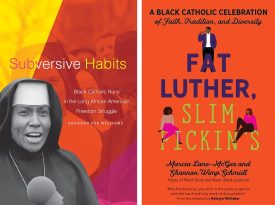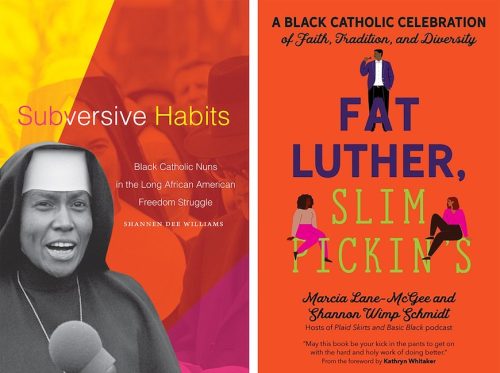By Kathleen Finley | Catholic News Service
“Subversive Habits: Black Catholic Nuns in the Long African American Freedom Struggle” by Shannen Dee Williams. Duke University Press (Durham, North Carolina, 2022). 424 pp., $29.95.
“Fat Luther, Slim Pickin’s: A Black Catholic Celebration of Faith, Tradition and Diversity” by Marcia Lane-McGee and Shannon Wimp Schmidt. Ave Maria Press (Notre Dame, Indiana, 2022). 192 pp., $17.95.
In Catholic books, an African American perspective is usually missing; these two books attempt to address that important gap in different and complementary ways.
In “Subversive Habits,” historian Williams has given us a remarkable work of scholarship, one that may be distressing for many readers because she clears away any shred of doubt about the U.S. Catholic Church being racist from its very beginnings.
That, unfortunately, includes the key roles that women religious have played in the building of the church.
Williams writes, “Few have considered what it meant that most of the sisters to minister in the United States before 1850, including the nation’s earliest female saints and sainthood candidates, were slaveholders or people who relied on the labor, sale and brutal mistreatment of enslaved people — and the economic benefits of whiteness and racial segregation — to establish and secure the financial futures of their orders and celebrated social service institutions.”
As she traces the hidden history of Black sisters, she admits that the only Black nun she had ever seen personally was Whoopi Goldberg’s fictional character in the movie “Sister Act.” That was true also of her mother, both of them lifelong African American Catholics.

Williams, a Catholic News Service columnist, tells story after story of institutional and personal barriers to pursuing religious vocations for African American women who, in many cases, were of mixed race because of their white fathers’ unions with Black women.
Most white religious communities refused to accept Black applicants, unless they could “pass” for white — and in several cases when women who were in positions of authority were later found to have been Black or of mixed race, they were largely erased from the community’s archives.
Because of a lack of acceptance by white religious communities, several Black religious orders were founded in the South, mainly to serve in Black schools and health care institutions, although many priests saw them as a “profanation of the habit.”
In at least one case, a Black religious community was not allowed to wear a habit in their early years so as not to arouse any further community opposition than necessary. Some women of color who wished to enter religious life fled to Canada or elsewhere to be able to live their vocations peacefully.
Even the Sisters of the Blessed Sacrament, established by St. Katharine Drexel specifically to minister to Native Americans and Blacks, refused to admit African American or Native sisters into its novitiate for many years.
By 1903, a Belgian priest ministering in Virginia complained to Rome about white religious communities. “In every convent of religious women, a girl having a little Negro blood in her veins is immediately rejected. It does not matter at all that she is well-educated, pious, pure and truly Catholic, so long as she seems Negro or there is the slightest suspicion of color.”
Even in the post-World War II era, Black women still had to battle for any acceptance at all in religious life, although their struggle was helped somewhat by the perspectives of Vatican II and the civil rights movement.
In 1989, when Sister Thea Bowman, one of the best-known African American women religious and then dying of cancer, addressed the U.S. Conference of Catholic Bishops she observed that most of those ministering in the Black community are not Black and “do not feel an obligation to learn or understand Black history or spirituality, or culture or life — Black tradition or ritual.”
As Williams clearly shows, in the face of nearly impossible odds, Black women religious have made impressive contributions to the church they love. “In the long-standing absence of an empowered African American clergy, Black sisters served as the most genuine and effective leaders of the African American community. …
“As educational and moral leaders, African American sisters instilled racial pride, molded community servants and, most important, taught that racism and sexism had no place in the church — long before the bishops and others collectively did so.”
The book “Fat Luther, Slim Pickin’s” shifts our focus from vowed religious to laywomen and a folksy look at everyday life in Black Catholic homes.
Authors Lane-McGee and Schmidt give the reader an informative glimpse into what celebrating the faith looks like for them, based loosely around the liturgical year, although the section on Ordinary Time seemed to be in an odd order.
The authors also have a podcast, “Plaid Skirts and Basic Black,” and give a helpful multiethnic view of the Catholic experience, although there may be too many in-jokes for those who may not have listened to them.
They describe their focus: “As Black women, we believe there is a place for everyone at the proverbial table, and that if there aren’t enough seats, we bring in another chair.
“This journey through the liturgical year is meant to create some additional space at that table for others to learn. In particular we are here to sit with our fellow Catholics of every background to help us all better understand our culture, our faith and our hope.”
“Fat Luther” explores several helpful topics of Black culture and history, such as appreciation vs. appropriation, soul food, Black hair, the Black church, even code-switching and colorism.
Each season includes a companion, such as St. Martin de Porres, and a gentle sense of humor at times. “And here’s the thing: the Holy Spirit doesn’t care if your Advent wreath is made from four tiny birthday candles you found at the bottom of a drawer. The Spirit will come as long as you make room.”
Pull up a chair and make yourself at home.
Also of interest: “Race and Rhyme: Rereading the New Testament” by Love Lazarus Sechrest. Wm. B. Eerdmans Publishing (Grand Rapids, Michigan, 2022). 414 pp., $39.99.
Finley is the author of several books on practical spirituality, including “The Liturgy of Motherhood: Moments of Grace” and “Savoring God: Praying With All Our Senses,” and formerly taught in the religious studies department at Gonzaga University.






















